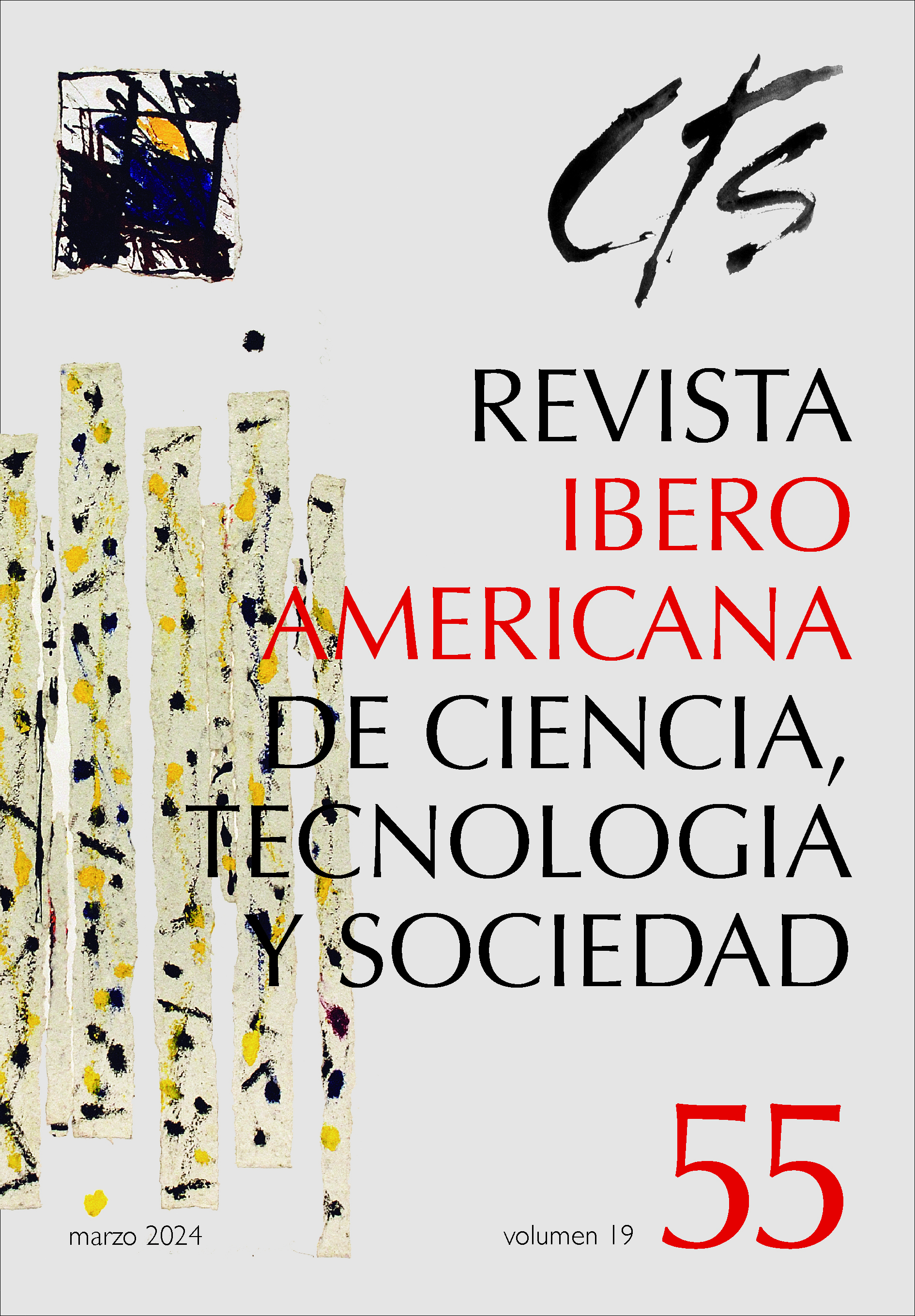Feminist Technoscience
A Demarcation Proposal
DOI:
https://doi.org/10.52712/issn.1850-0013-424Keywords:
feminism, demarcation, values, pragmatism, technoscienceAbstract
The recent debate on the feasibility of devising a new demarcation criterion to limit the role of undesirable values in technoscientific practice addresses different strategies. It is presented as a starting point that this problem cannot be delimited with fixed demarcation criteria, since the role of values is an open, contextual issue and subject to critical and situated evaluation. This article proposes to recover some of the findings of feminist philosophy of science to generate a general framework of proposals and strategies that, in a combined way and from a pragmatist philosophical perspective, can increase the rigor, integrity and reliability of technoscientific practice, and direct it towards ethically and democratically defensible goals.
Downloads
References
Alcoff, L. & Potter, E. (1993). Feminist Epistemologies. Nueva York: Routledge
Bleier, R. (1991). Feminist Approaches to Science. Nueva York: Teachers College Press.
Callon, M. (1999). Actor-network theory-The Market Test. En J. Law & J. Hassard (Eds.), Actor network theory and after. Oxford & Malden: Blackwell.
Carter, S. M., et al. (2020). The ethical, legal, and social implications of using artificial intelligence systems in breast cancer care. The Breast, 49, 25-32. DOI: https://doi.org/10.1016/j.breast.2019.10.001.
Coeckelbergh, M. (2021 [2020]). Ética de la Inteligencia Artificial. Madrid: Ediciones Cátedra.
Douglas, H. (2009). Science, policy, and the value-free ideal. Pittsburg: University of Pittsburg Press.
Echeverría, J. (2003). La revolución tecnocientífica. Madrid: Fondo de Cultura Económica.
Eubanks, V. (2021 [2018]). La automatización de la desigualdad. Madrid: Capitán Swing S.L.
Fricker, M. (2017 [2007]). Injusticia epistémica. Barcelona: Herder Editorial.
Franssen, M. & Kroes, P. (2009). Sociotechnical Systems. En J. Olsen, S. Pedersen & V. Hendricks (Eds.), A Companion to the Philosophy of Technology. Chichester: Blackwell Publishing Ltd.
Goisauf, M. & Cano Abadía, M. (2022). Ethics of AI in Radiology: A Review of Ethical and Societal Implications. Frontiers in Big Data, 5, 850-383. DOI: https://doi.org/10.3389/fdata.2022.850383.
Haraway, D. (1991). Simians, Cyborgs and Women. The Reinvention of Nature. Londres: Free Association Books.
Haraway, D. (1997). Modest_Witness@Second_Millenium. FemaleMan©_Meets OncoMouse™. Feminism and Technoscience. Nueva York: Routledge.
Haraway, D. (2019 [2016]). Seguir con el problema. Bilbao: Consonni.
Harding, S. (1986). The Science Question in Feminism. Nueva York: Cornell University Press.
Harding, S. (1991). Whose Science? Whose Knowledge? Nueva York: Cornell University Press
Harding, S. (2015). Objectivity and Diversity: Another Logic of Scientific Research. Chicago: University of Chicago Press.
Holman, B. & Wilholt, T. (2022). The new demarcation problem. Studies in History and Philosophy of Science, 91, 211-220.
Intemann, K. (2010). 25 Years of feminist Empiricism and Standpoint Theory: Where Are We Now? Hypatia, 25, 778-796.
Jasanoff, S. (2004). States of Knowledge. The Co-production of Science and Social Order. Londres: Routledge.
Jasanoff, S. (2016). The Ethic of Invention. Technology and The Human Future. Nueva York: W.W. Norton & Company Ltd.
Keller, E. F. (1985). Reflections on Gender and Science. New Haven: Yale University Press.
Kitcher, P. (2001). Science, Truth, and Democracy. Nueva York: Oxford University Press.
Kitcher, P. (2011). Science in a Democratic Society. Nueva York: Prometheus Books.
Kitcher, P. (2021). Moral Progress. Nueva York: Oxford University Press.
Koskinen, I. & Rolin, K. (2022). Distinguishing between legitimate and illegitimate roles for values in transdisciplinary research. Studies in History and Philosophy of Science, 91, 191-198.
Latour, B. (1992 [1983]). Ciencia en acción. Barcelona: Labor.
Longino, H. (1990). Science as Social Knowledge. Values and Objectivity in Scientific Inquiry. Princeton: Princeton University Press.
Longino, H. (2002). The Fate of Knowledge. Princeton: Princeton University Press.
Perdomo, I. (2016). Género y tecnologías. Ciberfeminismos y construcción de la tecnocultura actual. Revista Iberoamericana de Ciencia, Tecnología y Sociedad -CTS, 11(31), 171-193. Recuperado de: https://www.revistacts.net/contenido/numero-31/genero-y-tecnologias-ciberfeminismos-y-construccion-de-la-tecnocultura-actual/.
Pérez Sedeño, E. (2019). Feminist epistemologies and objectivity: moving towards a feminist science. En E. Pérez Sedeño et. al. (Eds.), Knowledges, Practices and Activism from Feminist Epistemologies. Wilmington: Vernon Press.
Pinch, T. & Bijker, W. (2012). The Social Construction of Facts and Artifacts: Or How the Sociology of Science and the Sociology of Technology Might Benefit Each Other. En W. E. Bijker, T. P. Hughes & T. Pinch (Eds.), The Social Construction of Technological Systems. New Directions in the Sociology and History of Technology. Cambridge: The MIT Press.
Resnik, D. B. (2009). Playing Politics with Science. Nueva York: Oxford University Press.
Resnik, D. B. & Elliot, K.C. (2023). Science, Values, and the New Demarcation Problem. Journal for General Philosophy of Science, 54, 259-286. DOI: https://doi.org/10.1007/s10838-022-09633-2.
Richardson, S. (2010). Feminist Philosophy of Science: History, Contributions, and Challenges. Synthese, 177, 337-362.
Rolin, K. (2021). Objectivity, Trust, and Social Responsibility. Synthese, 199(1-2), 513-533. DOI: https://doi.org/10.1007/s11229-020-02669-1.
Schiebinger, L. (1999). Has Feminism Changed Science? Cambridge: Harvard University Press.
Schiebinger, L. (2008). Gendered Innovations in Science and Engineering. Standford: Standford University Press.
Schiebinger, L. (2020). Gendered Innovation 2: How inclusive analysis contribute to research and innovation. Publicaciones de la Comisión Europea.
Wacjman, J. (2006 [2004]). El Tecnofeminismo. Madrid: Cátedra.
Wylie, A. et al. (1990) Philosophical Feminism. A Bibliographic Guide to Critiques of Science. Resources for Feminist Research, 19, 2-36.
Downloads
Published
How to Cite
Issue
Section
License
Copyright (c) 2024 CC Attribution 4.0

This work is licensed under a Creative Commons Attribution 4.0 International License.
All CTS's issues and academic articles are under a CC-BY license.
Since 2007, CTS has provided open and free access to all its contents, including the complete archive of its quarterly edition and the different products presented in its electronic platform. This decision is based on the belief that offering free access to published materials helps to build a greater and better exchange of knowledge.
In turn, for the quarterly edition, CTS allows institutional and thematic repositories, as well as personal web pages, to self-archive articles in their post-print or editorial version, immediately after the publication of the final version of each issue and under the condition that a link to the original source will be incorporated into the self-archive.











